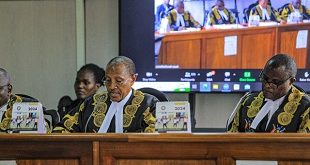In 2014, there has been little or no change as 79% of Ugandans still live in rural areas and 80% depend on agriculture for a livelihood of whom, 64% are subsistence farmers. Why is our society structurally stagnant? Is it because of Museveni’s mismanagement of the country? Dr. Kizza Besigye would say, “Certainly yes”. Ten years ago I would have agreed.
But I have grown to take research and comparative studies seriously. Sub-Saharan Africa is actually de-industrialising i.e. the share of manufacturing to GDP is decreasing across our vast continent. The only country that has taken manufacturing seriously is Ethiopia. Over the last 15 years and outside of mineral rich countries, it has had the fastest growing economy in Africa, followed by Rwanda. Meanwhile, Vietnam alone has more manufacturing jobs than the whole Africa combined.
If Museveni is the reason Uganda is not industrialising, what explains the entire continent?
If Museveni is the reason Uganda is not industrialising, what explains the entire continent? This means the phenomenon has deep structural roots that are beyond the influence of an individual president and government. In fact, Uganda has enjoyed an impressive rate of economic growth by global standards. As I have written before, over the last 25 years (2013-1989), Uganda has had the 11th fastest growing economy out of 189 nations globally – performing better than the economies of Singapore, Taiwan, South Korea, Mauritius and Botswana, the growth miracles of the 20th century. Yet although this has increased house hold incomes, reduced poverty and improved welfare of many Ugandans, it has not been accompanied by any significant structural transformation. Why?
The problem must be the policy stance Uganda – and most of Africa took; the adoption of private sector-led growth. Policies that encouraged free market competition (of which I have been a chief priest) may have allowed us to achieve short term allocative efficiency. But they have not provided the impetus for the structural transformation that lies at the heart of development.
If Uganda has to undergo structural transformation, it has to have a much more activist state. This means that the state would not only be an adjunct to private enterprise but a transformative agent in its own right. It would be a state that can intervene in the economy to stimulate investment in manufacturing through a selective allocation of long term affordable credit, subsidies and tariff protection of infant industry to private and public institutions.
The problem is that given the high levels of social polarisation in our ethnically diverse society, can this really work? This has been the challenge of postcolonial Africa. The initial postcolonial experiment in state-led industrialisation led to economic collapse. State enterprises became corrupt and inefficient as did private sector beneficiaries of state largesse. I, therefore, think an uncritical embrace of the efficacy of a benevolent state is dangerous. But so is the current blind faith in free markets. What should determine the choice between them requires a much longer debate. So I will return to it another day.
amwenda@independent.co.ug
 The Independent Uganda: You get the Truth we Pay the Price
The Independent Uganda: You get the Truth we Pay the Price



”If Museveni is the reason Uganda is not industrialising, what explains the entire continent?” Mwenda cant you express your message in a non revealing and expressive way that you are punting for Museveni for all purposes and intentions. What has really happened to your objective journalism. If you have no problem with the perpetual mediocre leadership many have. We know how many roads Zenawi tarmacked in 15 years and what dam he left. We also know how many roads tarmacked by your despot in 30 years and the corrupted minute Karuma and Bujagali dams. We know the dilapidation of all Mulagos, lack of dialyses and cancer machines in a third of a decade leadership.
The answer to this apparent conundrum is to be found in technology which is disruptive to economic or such predictive-based analysis by social sciences. Manufacturing itself is now done by robots. Even traditional professions such as medicine, law, teaching or journalism are gradually becoming robotized. Machines are replacing workers and process so that in future fewer and fewer people will be required in the professions. Think about it, one country, China, has been able to manufacture nearly all the worlds products. You hate to sound like a Luddite but the structure of future work or place is bound to be drastically different from what it has been thus far.
Exactly my worry Ocheto. At the rate of progress that we are witnessing, our children who are in Nursery might complete University 20 years later when all they learned is obsolete. The future looks grim. No wonder M7 is addicted to agriculture because he knows the human stomach is here for keeps; no matter what progress is realised in other fields. All the reason we should be united as one so we can continue to dominate the region in food production and export. My opinion is: Back to the yellow bus and away with political parties ( aka foreign assisted inflitrators). In just 5 years we would be the dominant nation in this region; beloved of all; including former enemies.
1.If i was the president,the cancer machine would be in the country in a week’s time (i) I would just travel with hot cash in my jet escorted with a cargo plane to carry the machine(ii) Regarding economic devt,i would use whatsup to monitor progress of development.(iii) Introduce use of petty cash to avoid inconvenience & bureaucracy.
2.Who told the medics that we should use a proton beam machine only? aren’t there any alternatives?? There are good hospitals in France, Saudi Arabia,Israel & German y don’t the technical team visit these facilities if i Winnie can fly to London at times twice in a week how about facilitating technical staff to window shop??Remember Arafat was poisoned with Polonium,Khaled Mashal was injected with opiod overdose and they were all referred to either France or Jordon for treatment this means they have facilities that can treat diseases with chemical & cancerous cells.
3.Nations normally keep their cash in foreign reserves for purposes of intervention during volatility in the market why keep such huge cash in a foreign land yet they tax our money? Once in a while we should deplete our reserves. During Obote’s time in exile,that was the kind of money that was facilitating the Adholas in exile.
4.I was looking at the GDP of Zambia its 29 Billion$ yet they have a population of 15million this means their standard of living is slightly better than the one of Ug coz the popn is manageable Ug’s GDP is 27Billion$ with a popn of 40 million Did you know that Nigeria’s GDP is 521 Billion $ S.Africa is 350 Billion$ & the standard of living in S.A is better than that of Nigeria?Much as Nigeria ‘s GDP is high the population is so big so services can’t be that good this simply means that the smaller the popn the better the services.
5.The vaule of a PhD of a scientist & that of arts based courses is different i used to think having a PhD & being a Professor was a big deal but waapi for those who studied Arts based programmes one can easily become a Prof basing on their publications in refereed journals & presenting papers now who cant do that?
6.Dr.Nyanzi really ashamed women with her black nickers that was even torn i dont know why old guys prefer torn undergarments the office she undressed for even has no floor tiles,curtains nor AC i have always doubted the sense of judgement of FDC chaps like Dr.Stella
Winnie, the number of PhDs in Arts are as many as DRC military generals. Like you say, quantity always undermines quality and starts to question it. These Drs are far too many to be (all) true. There is a time Prof Mamdani was lamenting the quality of Makerere graduates; saying he feels embarrassed when he is equated with them just because they all (he and them) trained and quaified from same University. So he suggested they all (he included) return their certificates and rewrite exams under international supervision. Personally, I have known graduates who do not know that 0.25 is smaller than 0.5 or that 1/4 is smaller than 1/2. You begin to wonder where they passed when they were on their way to University; knowing Uganda sieves 3 times before you reach any tertiary.
You wrote: “There is a time Prof Mamdani was lamenting the quality of Makerere graduates; saying he feels embarrassed when he is equated with them just because they all (he and them) trained and quaified from same University.”
Just a small point: I do know that Mamdani never studied at Makerere.
As for Dr Nyanzi stripping, it augurs badly for her fellow ladies who all along people say they get all they own (degrees included) by stripping for the awarders. Personally I know (not think) it is not true because I have known many girls who were enlightening us in complicated equations as per advice we received from teachers. Being of the old school, we were encouraged to know,recognise and respect those who understood faster than us so we could approach them politely and request to be enlightened. In that spirit we learnt more from schoolmates than from teachers. You will agree with me too that a woman without her man is 99% likely to enter (herself and others) into trouble… see Eve.
No wonder muslims don’t trust a woman to move on her own without a male over 7 years old.
You wrote: “No wonder muslims don’t trust a woman to move on her own without a male over 7 years old.” this is not just reactionary; it is archaic.
Andrew, under-five mortality rate and maternal mortality ratio are expressed as per 1,000 and 100,000 live births, respectively.
Thank you for the correction Dr but remember Andrew writes for professionals as well as lay-people and he attempts to strike a middle ground so all will understand; like the Holy Bible.
It’s funny that Ugandans still see things through short lenses, country can not transform until people get knowledgeable, not buildings or roads, that is an illusion.